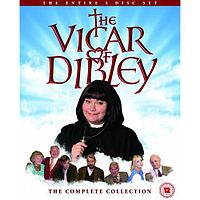1.What’s a vicar?
“Vicar” is another word for pastor. Maybe you’ve heard of the British TV show, “The Vicar of Dibley.”
In Britain, a vicar isn’t just the pastor for the people who show up on Sunday but for their entire town or area – their “parish.” That’s not really the case here in the USA but I think of myself as a vicar of my community — The Vicar of Bolingbrook.
Many pastors don’t just pastor our congregations, but our community in some way, too. Some serve as chaplains to the police and fire fighters. Others are involved with local schools and its students. Some are activists, fundraisers, or teachers. My way of pastoring my wider community is by writing about it and for it.
2. What’s the Episcopal Church?
The Episcopal Church is a Christian denomination, a community, and a movement in the United States. It’s hard to define a whole tradition in just a few sentences, so how about a few nouns instead? “Episcopal” means: communion every Sunday, The Book of Common Prayer, real wine, candles, male and female priests, kneeling, standing, sitting, adult and infant baptism, four scripture readings every Sunday. We value common prayer and worship more than we value making sure everyone believes the same thing. We’re descended from Christians who came to North America and brought the traditions of The Church of England with them. We’re part of the worldwide Anglican Communion. We used to be the “upper class church.” That’s still true in some ways, but The Episcopal Church as The Establishment Church has died…and something else is being resurrected in its place. I believe we’re part of that “new thing” at St. Benedict.
Want to know more? Email me or check out http://www.episcopalchurch.org/
3. What’s a priest?
An Episcopal “priest” is pretty much the same as a pastor. Like Roman Catholics, we use the word “priest” because we have a particular understanding of what it means to ordain someone as clergy; we believe that serving the church, blessing bread and wine at communion, and blessing a gathered group of Christians, among other priestly tasks, have a meaning that is connected to your ontology, your body and your being, and not just a role you play.
4. “Vicar,” more technically
A vicar is someone serving in the place of someone else (think of the word “vicariously”). I used to serve “vicariously” in place of my bishop as the leader of my congregation. Technically, the bishop was our “rector,” or senior pastor, because we were financially dependent on the financial support of our diocese until 2015, when we finally had the resources to stand on our own. We became a full “parish” and I became a “rector” instead of vicar. However, I still consider myself “Vicar of Bolingbrook,” even if I’m the rector of St. Benedict!
By the way, in England, few churches are financially independent from the national church so most Anglican priests are called “vicars.”



